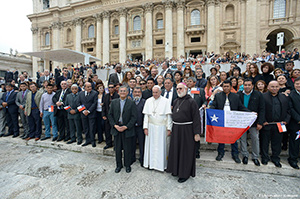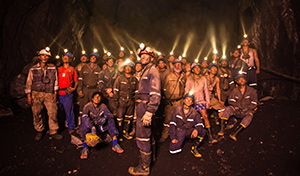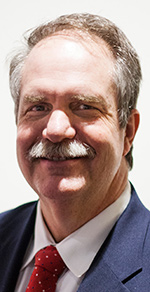By now, most of the world knows the story of the Chilean miners.
 Pope Francis poses with the Chilean miners and their families in St. Peter’s Square Oct. 14. (CNS photo/courtesy Joahnna Cruz, Grace Hill Media)The drama unfolded between Aug. 5, 2010 – when the 100-year-old San Jose Mine collapsed near Copiapó, Chile, trapping 33 miners 200 stories underground – and Oct. 13 of that same year – when those miners emerged unharmed – has been well-documented.
Pope Francis poses with the Chilean miners and their families in St. Peter’s Square Oct. 14. (CNS photo/courtesy Joahnna Cruz, Grace Hill Media)The drama unfolded between Aug. 5, 2010 – when the 100-year-old San Jose Mine collapsed near Copiapó, Chile, trapping 33 miners 200 stories underground – and Oct. 13 of that same year – when those miners emerged unharmed – has been well-documented.
It’s now a film — “The 33” — starring Antonio Banderas. It premiers in theaters this week.
But the man behind the rescue itself is less widely known – and he’s just fine with that. Greg Hall is a Texas-based businessman who owns several companies, including one in Chile that manufactures equipment used by mineral exploration drillers. He’s also a Catholic deacon who serves in the Archdiocese of Galveston-Houston.
The Chilean government called on Deacon Hall’s expertise less than 24 hours after the collapse of the mine in 2010, and it was his “Plan B” team that extracted the miners 69 days later. But Deacon Hall, 54, insists the victory is not his to claim.
“I’ve always said, ‘God drilled that hole,’” he told the Catholic Herald in a phone interview. “I just had a good seat.”
A miracle at 800 meters
When the main ramp of the San Jose Mine collapsed, Chile’s National Emergency Office scrambled to assess the situation and determine  Actors portraying the Chilean miners await rescue in “The 33,” a film starring Antonio Banderas and Lou Diamond Phillips, that premiers in theaters this week. (Submitted photo courtesy Joahnna Cruz, Grace Hill Media)how to locate the trapped miners.
Actors portraying the Chilean miners await rescue in “The 33,” a film starring Antonio Banderas and Lou Diamond Phillips, that premiers in theaters this week. (Submitted photo courtesy Joahnna Cruz, Grace Hill Media)how to locate the trapped miners.
“Going through some shafts, (rescue workers) were only able to get down 400 meters in depth. The mine company knew the deepest shaft they ever drilled was 800 meters in depth,” recalled Deacon Hall. “So they knew that if they were going to find them alive, it would be somewhere between 400 and 800 meters. So the plan was to get all the local drilling companies to bring their drill rigs out there and start drilling blindly.”
But the local drilling companies were only equipped with drills that would reach 420 meters. The government enlisted Deacon Hall’s company, located five hours away in Antofagasta, Chile, to supply longer drills.
“No one knew where the miners were,” he said. “The plan was to take these drill rigs and start doing a blind grid search – just drilling down to 800 meters, pulling up and move over, and hope to find somebody. That was the first 17 days. I have to tell you, after day 10 … we were drilling a recovery effort, not a rescue effort.”
Families anxiously await news
The situation was emotionally trying; miners’ families had converged upon the rescue site to await news about their loved ones. These people and their handmade signs imploring rescue workers to find their family members were a constant reminder to Deacon Hall, himself a father, of the importance of the job he was doing.
 Deacon Greg HallOn the 17th day, Deacon Hall and his team hit a void in the earth and heard tapping on their drill pipe – the miners were alive.
Deacon Greg HallOn the 17th day, Deacon Hall and his team hit a void in the earth and heard tapping on their drill pipe – the miners were alive.
“They were starving to death; they had run out of food seven days before, but we were able to find them,” said Deacon Hall. “We sent down a video and audio cable and they were able to give their greetings to their families. I was given a copy of that … and as I watched that, I felt like I was kind of part of the family.”
His mission complete, Deacon Hall returned to Cypress, Texas, where he runs Drillers Supply International and lives with his wife of 32 years, Angelica.
“I’m monitoring what’s going on – hearing the rescue plans are calling for six months, seven months, eight months, and they’re really not really feasible, at that,” he recalled.
The plight of the miners, whose voices and faces he had come to know from the audio and video feed, as well as the desperation of their families, plagued him.
“I couldn’t really sleep at night – I kept getting up, and I told my wife, ‘You know, what would we do if that was our son down there? What would we do if that was my brother? Would I just sit here and hope somebody would help them? Of course not – we’d try to dig them out with our bare hands,’” he said. “That’s what gave me the prompting to sit down and start trying to figure out a way to save them.”
No scientific solution possible
But science was telling him they couldn’t be saved.
“All the computer models we did, all the calculations we did didn’t work, because we knew that we had to drill a minimum of a 26-inch hole through solid rock, 635 meters, and we couldn’t use fluids. You can’t really do that,” he said.
The equipment required for the job would cause too many vibrations and would risk killing the miners in the process.
“But what would you do if that was your brother?” said Deacon Hall. “So I started trying to put together what I would do with what I had.”
An associate connected Deacon Hall with Brandon Fisher of Center Rock, a drill manufacturer in Pennsylvania, the producer of a cluster hammer – “little hammers that you put together,” he said. “I saw that and I thought, you know what, this might work.”
Deacon Hall and his team headed back to Chile, but though they had a plan, optimism was in short supply. Not only did rescue workers have to accommodate a tricky political situation existing around the Chilean president and his administration, but their plan itself didn’t technically work.
“About 80 percent (of the government officials) said, ‘Nah, that won’t work,’ and the other 20 percent said, ‘We got nothing else,’” recalled Deacon Hall.
The plan was dubbed “Plan B” and involved using a less aggressive drill to create a borehole through hundreds of feet of rock, manipulating several dangerous curves. At several points over the next few weeks, he and his crew were certain Plan B had failed.
Focus of his prayer changes
Deacon Hall relied on the Liturgy of the Hours to buoy his faith through the darkest moments. On one particularly bad day, after a setback on the job, “I remember the Psalm was Ps 63:2, which says, ‘Oh God, you are my God, for you I long, my body has pined for you like a dry weary land without water,’” recalled Deacon Hall. “I thought, man, here I’ve been praying and I’ve been asking God to help me, but I’m failing, I’m failing completely. But he’s here – the same spirit of God that was with Moses out in the desert, the same spirit of God, the Holy Spirit that’s in our Eucharist is with me. And so pretty much at that point I said, ‘Hey, we’re changing the dynamic – I’m no longer praying that you help me, I’m praying that you do it and I help you.’”
Deacon Hall and his team forged ahead, but when they were only 120 meters from the miners, the hammer became stuck, and it seemed, once again, that hope was lost.
“The miners were calling me, asking me, ‘Greg, what are you doing, we can almost see you, come get us, why have you stopped drilling?’ I didn’t have the heart to tell them that I had failed – but I had failed, we had failed. There was nothing I could do about it,” said Deacon Hall. “And I just remember thinking about it – you know what, it’s not my job, it’s his. I told God directly with the words, and I’ll never forget them – I said, ‘Listen, I’ve done everything I can, we’ve done everything we can, we failed. Those are your sons down there as well. If you want us to keep on going you’re going to have to send your angels down to dig them out.’ That’s what happened. We got unstuck and we were able to continue to go down and we were able to reach them.”
Deacon Hall still regards their success as “100 percent” miraculous.
“After this, we’ve been approached four different times by four different companies to drill (similar) holes, not even this hard, but to use our technology, and I’ve refused to be involved in any of them, and they’ve all failed,” he said. “You can’t drill that hole.”
After rescue, ordination
A few months after the rescue, in February 2011, Deacon Hall was ordained a permanent deacon by Cardinal Daniel N. DiNardo. His experience with the Chilean mine collapse continues to impact his ministry.
“I’ve had so many people come to me broken, wondering where the miracles in the world are,” he said. “You know, they’ve read about them in the Bible and they don’t see them in the world even though they’re there. This is a miracle, and this was seen by a billion people.”
He also credits the rescue in Chile with giving him the confidence to successfully combat the Department of Health and Human Services mandate requiring employers to provide insurance coverage that includes abortifacients and birth control. In December 2014, Deacon Hall’s Minnesota-based company, American Manufacturing, was the first company in the state to achieve a permanent injunction against the mandate.
“I know that it was due to this miracle of the Chilean mine rescue that gave my wife and (me) the courage and the perseverance to sue the Obama administration, to fight their mandate,” he said.
A father and grandfather, Deacon Hall feels his experience with the Chilean miners helped him come to a new understanding of the Body of Christ as a singular human family.
“One of the things I always like to say when I give talks is that I couldn’t sit at home (ignoring the miners’ predicament) because what would I do if that was my brother trapped in that hole?” he said. “We’ve all got to realize — in our own families, our communities, our cities – we have so many people trapped in deep, dark holes that they can’t get out of. Maybe it’s by their own doing, maybe it’s by circumstance, but we’ve got to realize, each one of those are our brothers and sisters, because we’ve all got the same daddy, the same abba. And we can’t sit there and hope somebody else does something. We can’t.”
